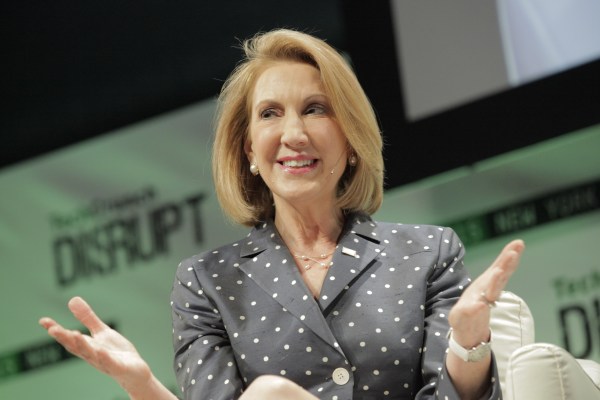Wrapping up her interview onstage at TechCrunch Disrupt with presidential candidate Carly Fiorina, TechCrunch’s Sarah Lane asked a pretty common question for a candidate running for president — if you don’t win, are you interested in serving as vice president?
“Would you ever ask a man running for president that question?” Fiorina said.
It was an odd response to a question that interviewers would ask anyone who was running for president but had a slim chance of actually taking the party’s nomination. It’s a reason many politicians run long-shot campaigns, and one that could easily be asked of many of the male candidates running for the Republican nomination, including Marco Rubio and Mike Huckabee.
In fact it’s asked so frequently that the New York Times referred to it as the “worst question” of the 2004 election because reporters asked it of John Edwards at every campaign stop.
Fiorina’s response was an insubstantial and thinly veiled attempt to avoid answering a question. She would have been better off responding with a “no comment.” In one day since she’s announced her bid she’s used it twice; yesterday it was during an interview with Katie Couric.
“Would you ever ask a man running for president that question?” Carly Fiorina
The answer was a disappointing twist in an interview in which she highlighted the unique skills a female candidate could bring to the Oval Office when compared with the men in the race. She said it was a “great thing” that both parties had women in the race, while noting that she’s running to beat Hillary Clinton. She said women are better at having longer conversations about policy issues and are less prone to the vitriol of short soundbites than male candidates.
“I’ve never been a token in my life,” she said. “I started out as a secretary. On the other hand the facts are that I’m a woman so I bring a woman’s perspective to the table.”
Gender will inevitably play a role in the 2016 presidential election, with Hillary Clinton leading the Democratic field. Now with Fiorina’s campaign announcement yesterday, two women are in the race to break the nation’s highest glass ceiling.
In 2008 Clinton avoided talking about her gender at all. As her opponent Barack Obama ran a primary campaign based on making history as the first African-American, Clinton never invoked the idea that electing the first female president could also be momentous. In fact the first time she spoke strongly about her gender was in her concession speech.
“Although we weren’t able to shatter that highest, hardest glass ceiling this time, thanks to you, it’s got about 18 million cracks in it, and the light is shining through like never before, filling us all with the hope and the sure knowledge that the path will be a little easier next time,” Clinton said in 2008.
As political analysts have noted, Clinton is back with a new gender strategy. My former professor, Jonathan Allen, noted in Vox that this time around, Clinton will “run like a woman.”
Clinton has teased that eradicating the gender gap in STEM positions and decreasing the pay gap will be a major issue for her in 2016. In recent visits to Silicon Valley, Clinton has appeared at women in tech conferences, and she will likely bring up the issue as she heads back to the area for fundraising this week.
As a former CEO of a major technology company, Fiorina is even more well-positioned than Clinton to advocate for this cause. Hopefully rather than playing the gender card to evade one of the most trite primary campaign questions, Fiorina will use it where it matters to enact meaningful change for 53 percent of the electorate.
